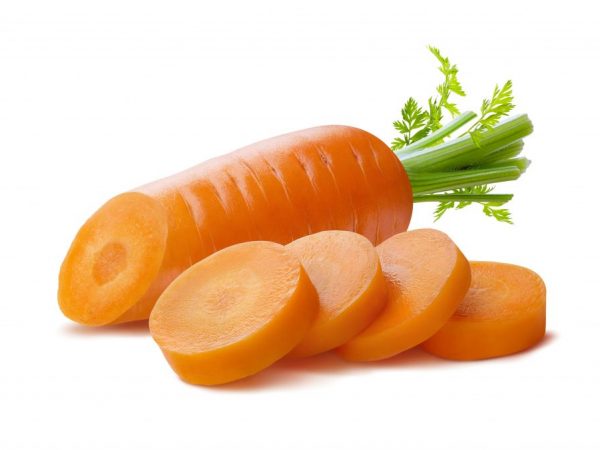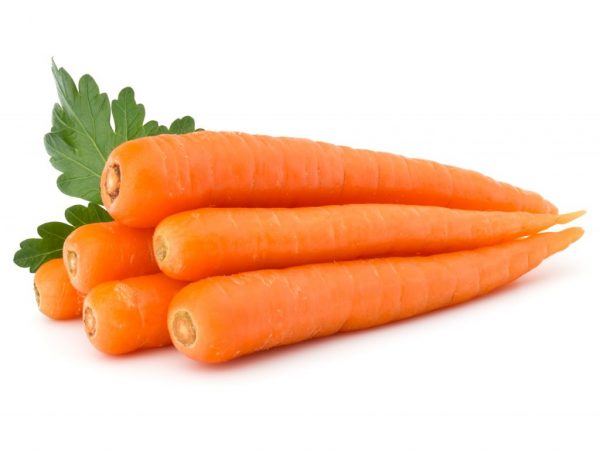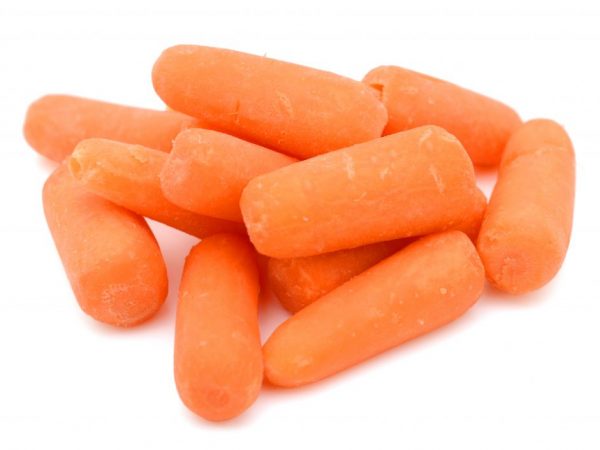The benefits and harms of carrots for people
The benefits and harms of carrots are well understood. This orange vegetable is recommended for the prevention of hypovitaminosis and a number of diseases. It is consumed both raw and boiled. But you can't get too carried away so as not to cause an overdose of vitamins. There are also a number of conditions in which eating a vegetable is generally not advised.
- The chemical composition of carrots
- Useful properties of carrot ingredients
- Vitamins
- Mineral components
- Other elements
- Benefits for different organs and systems
- Eyes and skin
- The cardiovascular system
- Impact on digestion
- Respiratory system
- Reproduction system
- Other systems
- Harm from carrots
- How to eat carrots
- Fresh carrots
- Carrot juice
- Boiled carrots
- The benefits of carrot tops
- Summarizing

The benefits and harms of carrots for people
The chemical composition of carrots
Before discussing the beneficial properties of carrots, you should know its chemical composition. The vegetable is 88% water. Carrots also contain carbohydrates, protein, fiber, and a number of other components. Its calorie content is low - only 36-39 kcal per 100 g.
Content of basic substances in 100 g:
- proteins - 3.1 g;
- fats - 0.1 g;
- carbohydrates - 6.8 g;
- fiber - 2.3 g;
- organic acids - 0.31 g;
- dry residue or ballast substances - 1.03 g;
- sugar and glucose - 6.76 g.
The composition is not stable, much depends on the variety, growing conditions. In addition to the main elements, the product includes a number of vitamins:
- beta-carotene - 12.03 mg;
- retinol (vit. A) - 2000 mcg;
- thiamine (vit. B1) - 0.062 mg;
- riboflavin (vit. B2) - 80 mcg;
- pantothenic acid (vit. B5) - 0.3 mg;
- pyridoxine (vit. B6);
- folic acid (vit. B9) - 8.95 mg;
- ascorbic acid (vit. C) - 5.021 mg;
- tocopherol (vit. E) - 0.4 mg;
- biotin (vit. H) - 0.062 μg;
- phylloquinone (vit. K) - 13.1 μg;
- nicotinic acid (vit. PP) - 1.1 μg.
The amount of some vitamins corresponds to the daily dose or even exceeds it, which gives additional advantages. It also depends on the variety. The more intense the orange color, the more carotene in the fruit. Purple, white, and yellow varieties have less of this nutrient.
The composition of carrots also includes macronutrients: 27 mg of calcium, 38 mg of magnesium, 200 mg of potassium, 56 mg of phosphorus, almost 80 mg of chlorine, sodium, sulfur. The table of trace elements is also extensive. The vegetable contains iron, copper, zinc, iodine, manganese, selenium, fluorine, chromium, cobalt, lithium, boron, etc.
Useful properties of carrot ingredients
The nutrients contained in carrots have different effects on the body. Some have an effect even in microscopic doses.
Vitamins
Carrots are the champion in beta-carotene content. Pumpkin, beets and other vegetables are significantly inferior to her. This substance is a precursor of vitamin A. It turns into retinol, reacting with fats, therefore it is recommended to use a vegetable with vegetable oil. Vitamin A improves vision, especially at night. He is responsible for the regeneration of the skin and mucous membranes, the growth of the skeleton.
B vitamins have a positive effect on the nervous system. Folic acid takes part in hematopoiesis, increases the amount of hemoglobin.Biotin affects the condition of the skin, hair, nail bed, it is often added to cosmetics. The dose of vitamin H in roots is high, so it has a great effect on the condition of the skin.
Tocopherol is a powerful antioxidant that reduces free radicals. Vitamins C and PP improve immunity, vascular condition, prevent mucosal bleeding. Vitamin K thickens the blood, is one of the factors of its clotting. In humans, phylloquinone is synthesized in the liver, but with hepatitis, cirrhosis, its deficiency is observed.
Mineral components

Carrots are rich in trace elements
The amount of minerals in a vegetable can replenish their supply in the body. Potassium and magnesium are essential for the regulation of the heart. Calcium and Phosphorus improve the health of bones, teeth, nails and hair. They are useful for children with intensive skeletal growth, and for the elderly with joint problems. Chlorine is involved in many biochemical processes within cells.
Trace elements that come with carrots also affect metabolism. Particular attention should be paid to iron. This mineral is part of hemoglobin and prevents the development of anemia.
Iodine is an important component of thyroid hormones, its deficiency leads to hypertrophy and disruption of the organ.
Carrots also contain fluoride, which affects the condition of the tooth enamel. Lithium and selenium are important elements involved in the functioning of the nervous system. Manganese helps with heart function, and copper is included in some liver enzymes.
Other elements
Many more useful elements and compounds enter the human body with carrots. The vegetable is rich in fiber, which regulates intestinal function. Organic acids are responsible for the vital functions of many systems, including the central nervous system and the heart, they improve the condition of the skin, stimulate the growth and division of cells.
The substance falcarinol prevents the development of cancer. On its basis, drugs are made. Phytoncides help fight bacteria and viruses, therefore the vegetable is useful for intestinal and colds infections. The benefits of carrots lie in their low calorie content - root vegetables are often recommended for dietary nutrition for overweight people.
Benefits for different organs and systems
The health benefits of carrots are not disputed. It is used to prevent the development of diseases.
Eyes and skin
Perhaps the most famous benefit of carrots is the improvement in vision due to beta-carotene. The lack of this substance provokes night blindness, people begin to see poorly in the dark. Eye diseases are also aggravated: blepharitis, conjunctivitis, myopia. If you regularly eat orange root vegetables, these problems can be avoided.
Vitamin improves the regeneration of the epithelium and endothelium, activates keratin and its synthesis, promotes the disappearance of acne, relieves inflammation, and has an effect on psoriasis. It is actively used in cosmetology for rejuvenation. Masks are done with care, since carrots give the face an orange color, which is difficult to wash off.
The cardiovascular system
The vegetable reduces the amount of cholesterol in the blood, as a result, it is not deposited on the walls of blood vessels. This prevents the development of coronary artery disease, hypertension, strokes and heart attacks. In addition, beneficial substances improve blood circulation in the central nervous system and peripheral vessels. The vegetable is recommended for people with high blood pressure, angina pectoris, during the rehabilitation period after a stroke or heart attack, even with varicose veins.
Impact on digestion

Carrot juice is able to expel parasites
Carrots have a beneficial effect on the health of the digestive system. Due to the high fiber content in the vegetable, intestinal motility improves, and nutrients are absorbed. Toxins and toxins do not stagnate, are quickly excreted from the body, which reduces the burden on the liver.This is the reason why the vegetable is advised to eat for hepatitis, cirrhosis.
A glass of juice, drunk on an empty stomach, weakens and liquefies feces. It is recommended to take it for constipation, bloating.
The useful properties of carrots for hemorrhoids have been noted. It promotes the elimination of parasites from the body.
It is advised to use not only the root vegetable, but also the crown. Green leaves are crumbled into a salad or dried so that they can be steamed later. The product has a choleretic effect, therefore it is useful to use it for the prevention of cholelithiasis.
At the beginning of the last century, the Slovak doctor Moro invented a special recipe for carrot soup, with which he saved many children from intestinal infections. The fact is that the fruit has bactericidal properties, prevents the adhesion (attachment) of bacteria to the intestinal wall. Doctors still use this root vegetable to treat diarrhea.
Respiratory system
All parts of the plant are recommended to be taken as a cough suppressant. They are primarily shown to smokers. A glass of juice or tea from dry tops with seeds twice a day reduces the harm from smoking by 10-20%. The vegetable liquefies well and removes phlegm, reduces cough symptoms.
Also, carrots are recommended for colds, sore throats, after removal of the tonsils. The bactericidal properties of the vegetable contribute to a quick cure, prevent complications. Inhalations are made from dry seeds and tops; it is also advised to drink the juice in a heated form.
Reproduction system
Treatment with ordinary carrots can get rid of many ailments of the reproductive organs. Vegetables are advised to eat in case of violation of the production of sex hormones in girls and adult women, menstrual irregularities. Root crops are useful for thrush, inflammation of the genitals. They are recommended for pregnant women and nursing mothers.
Juice and raw vegetable increase potency in men. Some components are even used for the manufacture of drugs, the use of which increases male fertility. It is recommended to eat carrots for male infertility, after prostate surgery.
Other systems
Carrots also contain a number of antioxidants besides tocopherol. They neutralize and prevent the destructive effect of free radicals on cells, prevent the occurrence of cancer.
This vegetable is recommended for patients with diabetes mellitus: it lowers blood glucose levels. Carrots have a diuretic effect, they are included in the complex treatment of pyelonephritis, urolithiasis.
Indispensable root vegetable for children. It fully satisfies the daily requirement of carotene and other vitamins, strengthens muscles and bones, and stimulates their growth. For the elderly, it is recommended as a prophylactic agent against osteoporosis and aging. The gruel from the pulp is used as an antiseptic and a means to accelerate the regeneration of damage. It is applied immediately after injury or a compress is made at night.
The vegetable removes toxins from the body, so it is useful for acute and chronic poisoning, when eliminating from hard drinking. Carrots are good for a person who quits a bad habit: smoking, drug use. It is also useful for those who work in unhealthy industries.
Harm from carrots

The vegetable irritates the intestinal mucosa
The vegetable is useful for both treatment and prevention of diseases. But carrots also have contraindications. You can not use it with the following pathologies:
- Peptic ulcer of the stomach and duodenum in the acute period, high acidity. The root vegetable irritates the mucous membrane.
- Inflammatory diseases of the small intestine.
- Chronic diseases of the gastrointestinal tract. The use of root crops in such situations causes irritation of the mucous membrane, especially raw ones.
- Hypotension. Carrots lower blood pressure.
- Renal failure. The harm from carrots in this situation is associated with the high content of potassium, which, with poor kidney function, is retained in the body.
- Allergic diseases and hypersensitivity to the main components of the vegetable. Carrot seeds are a strong allergen.
- Large stones in the gallbladder and bladder. The choleretic and diuretic properties of carrots provoke a block of stones in the biliary tract or ureters.
Dentists recommend drinking the juice through a straw. When it gets on the teeth, it damages the enamel.
The harm from carrots will be if you exceed its dose. First of all, this effect is manifested by yellowing of the skin and mucous membranes. For example, in young children, the symptom is noticed even if they drink up to 5 tbsp. juice per week. In adults, the skin can turn yellow if you eat 2-3 kg of root crops or drink 2-3 tbsp every day. juice for 2-3 months. If the face turns yellow, stop eating the vegetable.
Sprouted carrots are not recommended: they contain selanin poison, which is harmful to health. It is especially dangerous for children, older people and pregnant women. Germination is observed in the spring, by which time the fruit has lost most of the nutrients.
How to eat carrots
The healing properties of carrots are manifested both in raw and boiled form. The vegetable works, regardless of the method of culinary processing, but it has its own characteristics. The usefulness of carrots does not disappear after cooking. At the same time, fried carrots are not recommended: they do not accept such processing.
Fresh carrots
Raw carrots are rich in vitamins. They are partially destroyed during cooking under the influence of temperature. Then, with vitamin deficiency, night blindness, it is advised to eat an unprocessed vegetable. There are many useful substances in the skin, therefore, it is not recommended to peel young carrots, it only needs to be washed well. Unfortunately, in its raw form, it is less digestible and absorbed than boiled. A raw food diet is contraindicated for certain diseases of the intestines and stomach.
If fresh carrots are grated on an iron grater, they will also lose some of the vitamins. Therefore, it is better to rub it on plastic. The puree is mixed with an apple and 2-3 drops of vegetable oil are added there. Such a dish will fill the daily need for all nutrients. For the prevention of colds, the treatment of sore throats, grated carrots with garlic or honey are made, celery is added. The products have phytoncides that kill bacteria and viruses. For the treatment of constipation, it is advised to grate the carrots on a coarse grater and mix with vegetable oil.
Carrot juice
Carrot juice is tasty and well absorbed. It is preferable to cook it yourself and eat it fresh. Store-bought juices are full of preservatives that are bad for your health. It happens that nectar is sold there, in which no more than 20% of real juice is.
If you prepare a drink at home for future use, some of the vitamins will be lost.
The root crop is stored for a long time, it is possible to get freshly squeezed juices until mid-spring. Drinking juice is advised after eating, then the healing property is more pronounced.
Boiled carrots
The benefits of boiled carrots are also great. Its properties as an antioxidant increase by 14-34%, which is especially important in oncology. Also, sugar is partially dissolved during cooking, therefore it is useful for diabetics.
Boiled carrots are soft and easier to bite for small children and elderly people with dental problems. It is easier for the digestive system to process such a vegetable.
Cooked carrots strengthen, so they are prescribed for diarrhea.
The benefits of carrot tops
It turns out that not only the root has beneficial properties. Her tops can help, too. It is recommended to use greens from this part of the vegetable for hemorrhoids, varicose veins, stress and diseases of the nervous system, eye diseases. It contains a lot of carotene, other vitamins and minerals, which are few or not at all in root crops.
The tops are finely chopped and added to salads and soups. The aroma of green leaves enhances the taste of food. For the winter they are dried, then steamed like tea, a decoction or a bitter tincture is made. Together with the tops, a shift is used.They have a good smell, are suitable as a seasoning for first or second courses. Eat them with caution: carrot seeds cause allergies in some people.
Summarizing
Useful carrots have medicinal properties, are used to prevent vitamin deficiency, a number of diseases and are indispensable in nutrition. It improves the condition of the skin, gives youth. These are all reasons why you should include this vegetable in your daily diet.
A person is recommended to eat 0.5 kg of root vegetables per day or drink 0.5-1 glass of juice. At the same time, they monitor whether the vegetable causes allergies, whether the skin turns yellow and whether the daily consumption rate is exceeded. If such symptoms are observed, carrots are either discarded or reduced in the diet. For example, they eat only 1 piece or drink juice every other day.


